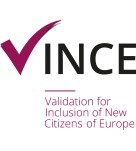Introduction
This is a template containing frequently asked questions (FAQs) from refugees and migrants about living in a certain country in Europe. We provide a template in English language with general answers as well as templates for eight Euopean countries using the local languages in the download-section below. Feel free to adapt or elaborate the suggested answers based on your country’s specifications!
Guidelines for Higher Education staff to help migrants and refugees.
Download & adapt the guidelines for your purpose!
Share the guidelines on your institution’s website.
Welcome to this Country – Frequently Asked Questions
This is a preview of the FAQ template “Welcome to this Country” in English language. Please mind that the answers are rather general and need to be adapted to the specific processes and regulations of the country. In the download-section below you can find FAQs tailored to eight European countries, using the local languages.
- All
- Conditions for refugees during and after seeking asylum
- General information on this country
- Systems for transport, health and working
- The school and education system
There are several ways and means for finding a job; for instance from the Public Employment Service, which will typically require that the person registers as a job seeker.
Jobs are often communicated throughout network, friends and neighbours in the local community. Besides, the personal initiative – simply calling by telephone or visiting an enterprise is often regarded a welcoming initiative to prove interest.
If applicable, a link to the local employment office or recruitment offices could be added.
Please refer to the “Welcome to Europe” Guidelines.
As the health system with entitlements for immigrants might differ among countries each partner insert a description of – or links to the health system, optionally structured with these topics:
- public or private system
- structure
- admission for citizens
- optionally specific requirements for migrants (and refugees)
- payment
- insurance
- telephone numbers for emergencies.
Relevant links could be added.
A map of or link to the local transport system could be added, optionally with a brief presentation of the transport system according to the suggested topics:
- transportation means in cities – metro, train, bus, tram, city-bikes
- transport routes in the country
- payment systems for transport.
Please insert a text about text about legal rights and entitlements for VPL, for the VPL providers / type of organisations. The text should include information about guidance and counselling resources, either stated by law as a legal right or with a reference to individual conditions by the HE institution. Information about guidance and counselling could be added to the HE institution website for study counselling.
Please also refer to the “Welcome to Validation” Guidelines.
Each partner inserts information about the Validation system, the rights, division of responsibility, funding and whatever relevant. The text should include the national laws and regulations for validation of prior learning.
An application for access to HE includes formal documents for the approved accession criteria. For applicants with a refugee background or other newcomers the situation might be that the applicant has started the HE in the homeland and not finished this. Official documents are important files as part of the application process.
In case these documents cannot be provided, an alternative path for assessment of the level of qualifications must be arranged.
Each partner insert information about how this process is carried out and by which authority.
A link should be added for more information about the authority for recognition of foreign education.
Please also refer to the “Welcome to Validation” Guidelines.
Various organisations (universities, governmental bodies, NGOs, etc.) may have already implemented courses, advice or support for migrants who wish to start or complete their higher education in the host country. For example, in the UK, a course called “Aim Higher”, designed to help refugees and asylum seekers get the information and support they need to apply to and enter UK universities is available. The course is run in a partnership between FutureLearn and the University of Cambridge and gives advice and support on the English language skills needed for university level study and includes the insights and experience of students who have gained places at UK universities. More information can be found by this link: https://www.futurelearn.com/courses/aim-higher
The website states that “This course is designed for refugees and asylum seekers looking to continue or start their Higher Education studies in the UK. It would also be useful for anyone who supports or teaches refugees hoping to study at university. The focus of this course is applying for, and preparing for undergraduate study.”
Information on similar offers for newcomers could be provided by the HE Institutions website.
Please refer to the “Welcome to Higher Education”-Guidelines.
The National Qualification Framework (NQF) forms the qualification system of the country. The NQF is an important tool for everyone who seeks education and for the labour market and education institutions. The aim of the Qualification Framework is to demonstrate the qualification level of the education together with the expected learning outcome, to make clear the different pathways through the education system and to increase mutual recognition between the national and the foreign qualifications.
Eight levels
The NQF is a coherent, systematic and levelled description of qualifications, achieved within the national education system. For each level there is a level description, characterizing important aspects of the level. Each level is described with the concepts: knowledge, skills and competences, which altogether characterizes the learning outcome for the level.
For more information, a link to the NQF with explanation could be provided.
To get an overview of how the entire national school and education system is structured, please insert a brief text or a graphic.
This depends of the legal status, as referred to above. Having had the permission to stay, the person with a refugee background will normally be responsible by him or herself to find accommodation.
Please insert a text of relevance for the national and local conditions and possibilities.
Information for language teaching is highly important for most foreign applicants to HE. The HE organisation can provide more information about language teaching at the levels appropriate for the language access criteria to the HE. Besides, special information on language teaching for refugees and immigrants could also be provided.
Some countries and municipalities provide language teaching for asylum seekers and for immigrants. The specific regulations for language teaching as a right or as a possibility differs among countries. Language teaching could be provided either by public or private organisations.
A link for more information about language teaching providers could be added to the institutions website.
See the answers above. The answer depends on the specific situation, either as an asylum seeker, or whether asylum has already been granted or denied.
Laws and regulations define the legal status, rights and responsibilities of the asylum seeker, including also the status after receiving asylum. The information about legal status for this topic should also include regulations for the situation of having had the asylum denied. The legal framework of the country clearly indicates whether studying and working is a right.
A link for more information could be added.
Please refer to the “Welcome to Europe”-Guidelines
- Please insert information according to national, municipal or regional law and regulations.
- Please insert relevant information about the formal process of asylum seeking, optionally by a link.
As the question cannot be answered generally the answer must be provided by specific references to actual conditions. For citizens without a job, public subsidies are available in accordance with the legal framework for social benefits. Due to laws and regulations for the area concerned, a fixed amount for the maximum ceiling of social benefits will be the situation for some countries.
There might be special regulations for asylum seekers and refugees granted permission of stay – either intermediately or permanently.
As for the rights and entitlements for refugees and immigrants, it is important to note the differences of these two categories according to access to social benefits.
Please insert relevant information.
EMPTY
As minimum wages normally depend on the labour market regulation of the country, please provide a reference to the national standard, if there is one. Information on minimum wages according to the legal system for labour negotiations and agreements could be provided by a link to national law and regulation.
For Information about unemployment benefit and social services see also the Q: How can I get into the social system of the country?
An overview of the business structure of the country combined with brief information about primary occupations could be provided or linked to from the HE Institution website.
Knowing and understanding the political system of the country is of great interest to new citizens. A description of the political system, explaining the main principles for participation in democracy could be added or linked to at the HE institution website.
Find below the suggested structure for topics for this question:
- The Constitutional Act
- The Parliamentary system
- The separation of powers
- Election and referendum
- Member of EU / with or without exemptions from the EU Treaty
A map with main cities, preferably also with the location of universities, should be added to the HE institution’s website together with names and type of universities and the educations offered by the university.
Downloads
Download the “Welcome to this Country”-Guideline in your language and adapt it to your needs:


